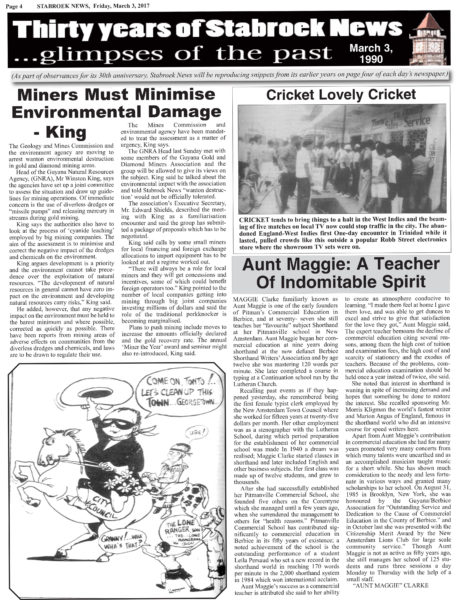Miners Must Minimise Environmental Damage
– King
The Geology and Mines Commission and the environment agency are moving to arrest wanton environmental destruction in gold and diamond mining areas.

King says the authorities also have to look at the process of ‘cyanide leaching’ employed by big mining companies. The aim of the assessment is to minimise and correct the negative impact of the dredges and chemicals on the environment.
King argues development is a priority and the environment cannot take precedence over the exploitation of natural resources. “The development of natural resources in general cannot have zero impact on the environment and developing natural resources carry risks,” King said.

The Mines Commission and environmental agency have been mandated to treat the assessment as a matter of urgency, King says.
The GNRA Head last Sunday met with some members of the Guyana Gold and Diamond Miners Association and the group will be allowed to give its views on the subject. King said he talked about the environmental impact with the association and told Stabroek News “wanton destruction’ would not be officially tolerated.
The association’s Executive Secretary, Mr. Edward Shields, described the meeting with King as a familiarisation encounter and said the group has submitted a package of proposals which has to be negotiated.
King said calls by some small miners for local financing and foreign exchange allocations to import equipment has to be looked at and a regime worked out.
“There will always be a role for local miners and they will get concessions and incentives, some of which could benefit foreign operators too.” King pointed to the number of local companies getting into mining through big joint companies investing millions of dollars and said the role of the traditional porkknocker is becoming marginalised.
Plans to push mining include moves to increase the amounts officially declared and the gold recovery rate. The annual ‘Miner the Year’ award and seminar might also re-introduced, King said.
Aunt Maggie: A Teacher Of Indomitable Spirit
MAGGIE Clarke familiarly known as Aunt Maggie is one of the early founders of Pitman’s Commercial Education in Berbice, and at seventy- seven she still teaches her “favourite” subject Shorthand at her Pitmanville school in New Amsterdam. Aunt Maggie began her commercial education at nine years doing shorthand at the now defunct Berbice Shorthand Writers’ Association and by age twelve she was mastering 120 words per minute. She later completed a course in typing at a Continuation school run by the Lutheran Church.
Recalling past events as if they happened yesterday, she remembered being the first female typist clerk employed by the New Amsterdam Town Council where she worked for fifteen years at twenty-five dollars per month. Her other employment was as a stenographer with the Lutheran School, during which period preparation for the establishment of her commercial school was made In 1940 a dream was realised; Maggie Clarke started classes in shorthand and later included English and other business subjects. Her first class was made up of twelve students, and grew to thousands.
After she had successfully established her Pitmanville Commercial School, she founded five others on the Corentyne which she managed until a few years ago, when she surrendered the management to others for “health reasons.” Pitmanville Commercial School has contributed significantly to commercial education in Berbice in its fifty years of existence; a noted achievement of the school is the outstanding performance of a student Leila Persaud who set a new record in the shorthand world in reaching 170 words per minute in the 2,000 shorthand system in 1984 which won international acclaim.
Aunt Maggie’s success as a commercial teacher is attributed she said to her ability to create an atmosphere conducive to learning. “I made them feel at home I gave them love, and was able to get dunces to excel and strive to give that satisfaction for the love they got,” Aunt Maggie said, The expert teacher bemoans the decline of commercial education citing several reasons, among them the high cost of tuition and examination fees, the high cost of and scarcity of stationery and the exodus of teachers. Because of the problems, commercial education examination should be held once a year instead of twice, she said.
She noted that interest in shorthand is waning in spite of increasing demand and hopes that something be done to restore the interest. She recalled sponsoring Mr. Morris Kligman the world’s fastest writer and Marion Angus of England, famous in the shorthand world who did an intensive course for speed writers here.
Apart from Aunt Maggie’s contribution in commercial education she had for many years promoted very many concerts from which many talents were unearthed and as an accomplished musician taught music for a short while. She has shown much consideration to the needy and less fortunate in various ways and granted many scholarships to her school. On August 31, 1985 in Brooklyn, New York, she was honoured by the Guyana/Berbice Association for “Outstanding Service and Dedication to the Cause of Commercial Education in the County of Berbice.” and in October last she was presented with the Citizenship Merit Award by the New Amsterdam Lions Club for large scale community service.” Though Aunt Maggie is not as active as fifty years ago, she still manages her school of 125 students and runs three sessions a day Monday to Thursday with the help of a small staff.
“AUNT MAGGIE” CLARKE

